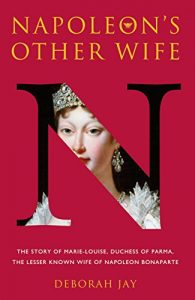Napoleon’s Other Wife is a dramatised biography charting the life of Marie-Louise, Napoleon’s second wife. Marie-Louise married Napoleon in 1810, sacrificed to save her father’s throne. The match was unexpectedly very successful, a loving relationship developing between them. But Napoleon’s defeats and exiles were to bring an end to their four-year union, and, forced to leave her son as hostage in Vienna, Marie-Louise was to spend the rest of her life as an exile, albeit a Duchess, in Parma on the Italian peninsula, fighting desperately to ride out the struggle for independence and unification of Italy and to stave off territorial predators.
Marie-Louise’s efforts were nothing short of heroic. The political complexities of her age, the impact of the French Revolution and the Napoleonic wars incited passions which turned her life into a living nightmare. Marginalised, she ignored prevailing morality and married secretly, raising two illegitimate children, scandalizing her family and Europe when the truth emerged years later. Resisting reactionary politics, passionate about the rule of law, equality of the sexes and fairness, she was a woman of integrity and mercy in an often merciless world, creating in her territories an oasis of enlightenment in Catholic Europe. Upon her death, revolution swept across the Italian peninsula, the patriotism previously suppressed out of respect for her finally deposing her successors.
The themes addressed are various: the condition of women, societal expectations and prejudices which still prevail today, the impact of a woman’s marriage, the vitiation of choice. The competing demands of family, often requiring self-sacrifice and denial of self-fulfilment, also find expression. Thus, Marie-Louise’s story continues to have contemporary relevance.
Napoleon’s Other Wife is targeted at a worldwide readership, at those who simply enjoy an extraordinary story, as well as those interested in Napoleonic, nineteenth-century and women’s history, not to mention the history of the Italian Risorgimento. It is apposite that the world should get to know Marie-Louise in the wake of celebrations of the Battle of Waterloo, as decisive for Marie-Louise’s future as it was for Napoleon’s.
Marie-Louise’s efforts were nothing short of heroic. The political complexities of her age, the impact of the French Revolution and the Napoleonic wars incited passions which turned her life into a living nightmare. Marginalised, she ignored prevailing morality and married secretly, raising two illegitimate children, scandalizing her family and Europe when the truth emerged years later. Resisting reactionary politics, passionate about the rule of law, equality of the sexes and fairness, she was a woman of integrity and mercy in an often merciless world, creating in her territories an oasis of enlightenment in Catholic Europe. Upon her death, revolution swept across the Italian peninsula, the patriotism previously suppressed out of respect for her finally deposing her successors.
The themes addressed are various: the condition of women, societal expectations and prejudices which still prevail today, the impact of a woman’s marriage, the vitiation of choice. The competing demands of family, often requiring self-sacrifice and denial of self-fulfilment, also find expression. Thus, Marie-Louise’s story continues to have contemporary relevance.
Napoleon’s Other Wife is targeted at a worldwide readership, at those who simply enjoy an extraordinary story, as well as those interested in Napoleonic, nineteenth-century and women’s history, not to mention the history of the Italian Risorgimento. It is apposite that the world should get to know Marie-Louise in the wake of celebrations of the Battle of Waterloo, as decisive for Marie-Louise’s future as it was for Napoleon’s.






